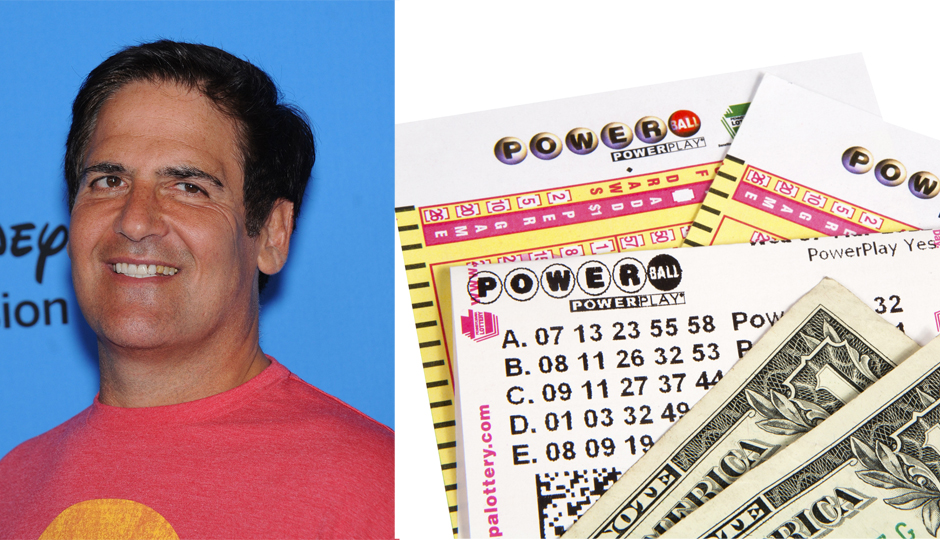Mark Cuban Is Dead Wrong On Powerball Advice

(Powerball image: karenfoleyphotography / Shutterstock.com)
Mark Cuban is obviously a smart guy. You don’t go from teaching disco dancing to a net worth of $3 billion by making stupid fiscal decisions.
That said, his advice for whoever wins tonight’s historic $1.5 billion Powerball lottery is way off base. Two things stand out immediately:
1. Don’t be an angel investor. “You don’t become a smart investor when you win the lottery,” said Cuban. “Don’t make investments. You can put it in the bank and live comfortably. Forever. You will sleep a lot better knowing you won’t lose money.”
So let me get this straight, the only people qualified to be angel investors are business guys who get rich? People aren’t born angel investors they become angels after they make a ton of money. Cuban was a new, young billionaire who bought an NBA team but realized that playing golf and going on vacations weren’t conducive to his lifestyle. So he jumped into angel investing. Thanks to the smash-hit Shark Tank, he’s the arguably one of the most famous and successful angels out there. But other people can’t do the same and filter money to promising young startups?
Marc Kramer, a serial entrepreneur who is president of Kramer Communications, said angel investing is an important way to share your new found wealth with the community — after, of course, being careful to consult with accountants and lawyers.
“Spend a year or more learning about angel investing by reading books such as Angel Investing: The Gust Guide to Making Money and Having Fun Investing in Startups, joining angel organizations like Robin Hood Ventures or Delaware Crossing Investor Group, and attending the annual Angel Venture Fair,” said Kramer. “I would bring in experts in fields I’m interested in and make investments in $100,000 increments. A $100,000 investment in a startup buys you a good percentage of the company — often ranging from 10 percent to 25 percent.”
He also says to get yourself on non-profit boards as a way to open doors for the companies you invest in. “I would ask my attorney and accountant who are the most successful angel investors and ask to co-invest with them so I could learn from them,” he said.
Still, new investors make plenty of mistakes. Kramer lays out seven of them here (including falling in love with “sexy technology” and thinking surveys don’t lie.)
2. Don’t take the lump sum. “You don’t want to blow it all in one spot,” said Cuban.
Perhaps Cuban is just reacting to the horrifying number of lottery winners who go broke soon after they win. In fact, the National Endowment for Financial Education says that approximately 70 percent of winners lose the money within just the first few years.
Martin Schamis, head of wealth planning at Janney Montgomery Scott, says that a lottery winner should immediately assemble a team consisting of an estate attorney, CPA and financial advisor — even before claiming their prize or deciding whether to take a lump sum or annuity.
In most cases, Schamis says to take the lump sum. After figuring out the maximum amount you should give to charity from a tax benefit standpoint and setting up trust funds for dependents to pass along money tax free, you can spend roughly 4 percent to 5 percent per year. Winning $1 million, for example, really just gives you $40,000 per year extra if it’s earning 4 percent in investments.
“With a lump sum, you get an opportunity to create a legacy,” he said. “You have more control over your money and it can last a lot longer than just your lifetime.”
People need to realize that winning the lottery is a life-changing situation “and whatever you’ve done leading up to this point doesn’t apply anymore,” he said. “Mark’s advice is just as bad as any other out there. You don’t know what to tell someone something without knowing their particular situation.” Schamis said a lottery winner should figure out their dreams then lean on their team to help execute them.
This should seem obvious, but don’t go buying expensive stuff right away.
“What usually bankrupts lottery winners is they drastically change their lives quickly,” he said. “All the sudden the cash flow required to support the is new lifestyle is greater than the amount the lump sum can generate.”
Like what you’re reading? Stay in touch with BizPhilly — here’s how:
- Follow BizPhilly on Twitter and follow editor Jared Shelly here.
- Get the BizPhilly Newsletter
- Like BizPhilly on Facebook
- Check out the BizPhilly homepage


